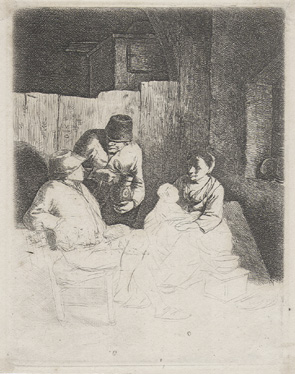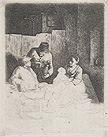| Title: |
Family in the Inn ("La Mere au Cabaret") |
| Artist: |
Bega, Cornelis (Haarlem, Holland, c. 1631 - 1664) |
| Date: |
c. 1660 (Posthumous Impression) |
| Medium: |
Original Etching |
| Note: |
"Bega's later tavern scenes do not have the cozy mood of his teacher
Ostade's works of the 1640's on. They are characterized by a harsher
mood, a furtive, even sinister air." *
|
| |
"Bega, Ostade's best pupil, ... is visibly much fuller than his
erstwhile master, of virile qualities; he has energy and decision; he
is more largely pictorial; he is certainly broader in the effects aimed
at, and thoroughly attained. About his strength there is refreshment
and renewal. ... Bega depicts with an amazing force and charm those
two things in the world with which he elects to be concerned: shadow
and light in the first place, and, in the second, the human life of
the class it has been his pleasure or his fate to live amongst." **
|
| |
In the great history of seventeenth century Dutch etching
the prints of Cornelis Pietersz Bega stand alone. Dutch etchings of daily
life were not uncommon. Scenes of peasants in taverns and inns were so popular,
in fact, that they almost constituted a genre. Bega, however, took this
common subject matter, previously rooted in the laughable or sentimental,
and transformed it with emotional intensity. |
| |
Born in Haarlem, Cornelis Bega was the son of a silversmith
and the grandson of the mannerist painter, Cornelis van Haarlem. He studied
etching and painting techniques under Adriaen van Ostade (1610-1685), and
shared his master's inclination for depicting peasant scenes. |
| |
Cornelis Bega's earliest work dates from 1650. Apart from travels in
1653 to both Germany and Switzerland he remained in Haarlem for all of his
short life. He was admitted to the Haarlem Artist's Guild in 1654 and died
ten years later. |
| |
The graphic oeuvre of Cornelis Bega consists of but thirty-six
etchings. Of these twenty-one are either single head portrayals or full
length figure studies. His fame, therefore rest upon the remaining (and
remarkable) fifteen etchings created near the end of his life which depict
groups of figures, in tight, geometric forms. For instance, in Family
in the Inn, the figures are almost locked together in a pyramidal grouping.
This structure is fully heightened by the strong contrasts of light and
dark, behind them, and by the intentionally unfinished foreground. Our eyes
are fixed to the primary three figures and their motions and expressions. |
| |
Coming between the man and his wife and newly born child
is the inn keeper, holding a large container of ale. An uncomfortable rift
is thus created, emphasized both by the sinister appearance of the inn keeper
and by the dark shadows in the background. Is Bega thus suggesting that
alcohol is the danger that might possibly cause ruination to this family?
Perhaps, but the emotional elements within this great etching are neither
straightforward nor didactic. |
| |
Unlike many of his contemporaries, Cornelis Bega's mature etchings
and paintings of peasant life do not seem to point to moralizing commentary.
Rather they depict a highly imaginary world of figures set within strong
areas of light and dark more reminiscent of a theatre stage than an inn
or tavern. In these ways, Bega's art is much closer to the etchings and
aquatints of Goya and his Caprichos than to his fellow seventeenth century
Dutch etchers. Within this theatre he gives us humanity, complete with its
inevitable virtues and vices. In Family in the Inn the inn keeper
definitely introduces a threatening element but this is countered by the
obvious love and caring we see in the mother to her child. Such ambiguities
always lie in close proximity and Bega's genius lies in his unique ability
to portray them. |
| Raisonnes: |
Eugene Dutuit, Manuel de l'amateur d'estampes: Ecoles
flamande et et hollandaise, Paris, 1881. |
| |
Catalogue #31, Second and Final State. |
| Reference: |
* Clifford S. Ackley, Printmaking in the Age of Rembrandt,
Boston, The Museum of Fine Arts, 1981, p. 256. |
| |
** Frederick Wedmore, Etchings, London, Methuen,
1912, pp. 16 and 17. |
| Size: |
6 X 4 1/2 (Sizes in inches are approximate, height
preceding width of plate-mark or image.) |
| |
Framed and Matted with 100% Archival Materials |
| Condition: |
Printed on thin, laid paper with small margins extending past
the plate-mark on all sides. Like all second state impressions of this famous
etching, the contrasts between light and dark are not as sharply defined
as in the very rare first state. Yet this impression bears all the fine
lines in the foreground that are usually eliminated in late printings. It
is thus probable that this particular impression was printed in the early
eighteenth century. Containing faint tape staining on the verso upper corners,
else a finely printed impression and in very good condition throughout.
Family in the Inn represents a superb, original example of the
famous etched art of Cornelis Bega. |
| Price: |
Sold - The price is no longer available. |
| Important Information: |
The artist biographies, research and or information pertaining to all the original works of art posted on our pages has been written and designed by Greg & Connie Peters exclusively for our site, (www.artoftheprint.com). Please visit us regularly to view the latest artworks offered for sale. We will soon be posting an update of our most recent research and include the biographical and historical information pertaining to our next collection of original works of art created by artists throughout the centuries. We hope you found the information you were looking for and that it has been beneficial.
Our Gallery, (Art of the Print / www.artoftheprint.com) guarantees the authenticity of every work of art we sell 100%. Full documentation and certification is provided. We offer a wide selection of international fine art dating from the early Renaissance to the contemporary art period. |




![]()
![]() or
phone Greg & Connie (905) 957-6666
or
phone Greg & Connie (905) 957-6666